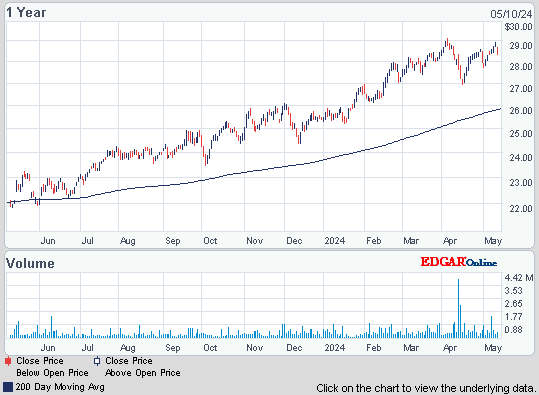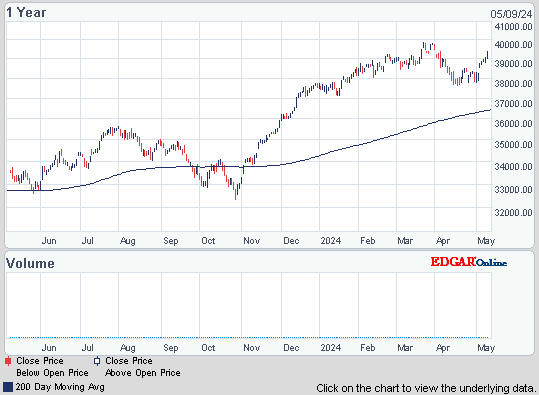Stocks were weak all day with added selling in the PM. Dow finished down 61, decliners over advancers 5-2 & NAZ lost a big 35. Bank stocks led the selling again, taking the Financial Index down almost 2 to the 206s (near its lows for the last month).
The MLP index dropped a big 4+ to the 494s but the REIT index was off 1 to the 261s (just below its multi year high). Junk bond funds slid back after a good month in Apr & Treasuries were little changed. Oil fell after the US gov said worker productivity fell sharply in Q1. Gold was lower & continues drifting in the mid to lower 1600s.

![Live 24 hours gold chart [Kitco Inc.]](http://www.kitco.com/images/live/gold.gif)


Photo: Bloomberg
Worker productivity in the US fell in Q1, the most in a year as stronger hiring at the start of the year was partly responsible for the drop. While worker output rose, the number of hours worked increased even more which lowered productivity in Q1 at an annual rate of 0.5% according to the Labor Dept. It fell after increasing at an annual rate of 1.2% in Q4 2010. A decline in productivity could be a positive sign for jobseekers by signally that companies are struggling to squeeze more from their work forces & must hire to meet rising demand. But the bad news for workers, is that hourly compensation increased just 1.5%, a key reason labor costs rose at a 2% rate in Q1, slower than the 2.7% increase in Q4. Productivity grew last year at the slowest pace in nearly 25 years after rising sharply in 2010. The main reason productivity soared in 2010 was that it followed the worst recession in decades, when employers laid off millions of workers, typical during & after a recession. Companies tend to shed workers in the face of falling demand & increase output from a smaller work force. Once the economy starts to grow, demand rises & companies eventually must add workers.

Photo: Bloomberg
US service industries expanded less than projected & consumer confidence weakened, signaling the economy may be cooling. The Institute for Supply Management said its non-manufacturing index fell to a 4-month low of 53.5 in Apr from 56 in Mar. It was also below the forecast of 55.3 (a reading above 50 signals expansion). In addition, the Bloomberg Consumer Comfort Index fell to a 2-month low last week. The ISM services survey covers industries ranging from utilities & construction to retailing & finance. However, a report released Tues showed manufacturing unexpectedly accelerated in Apr to the fastest pace in almost a year & that factory employment picked up. Expansion among service industries may be moderating after a surge in Q1 that coincided with the strongest pace of job growth in 6 years. The report showed that of new orders decreased to 53.5, the lowest in 6 months, from 58.8, & the employment gauge dropped to 54.2, the weakest this year, from 56.7 in the prior month. More mixed news with a modest negative bias.
Service-Industry Slowdown in U.S. Signals Growth May Be Cooling: Economy

Photo: Bloomberg
ECB President Draghi left open the option of further stimulus if the economy continues to deteriorate as investors await the outcome of elections in Greece & France. He pointed to new growth & inflation forecasts next month that may change the ECB’s policy stance. Uncertainty about the commitments of future leaders in Greece & France to fiscal reforms, paired with worsening economic data & renewed tensions in financial markets, may force the ECB’s hand. The ECB has already flooded financial markets with more than €1T ($1.3T) to avert a credit crunch, but have signaled they’re reluctant to do more for now as they press govs to enact reforms. “We’ve discussed quite extensively the monetary policy stance” which “we found accommodative in view of an economic outlook that becomes more uncertain,” Draghi said, suggesting that the ECB will wait to see how its lending to banks will feed into the real economy. Keep on eye on the goings on in Europe.
Draghi Leaves Door Open for Further ECB Stimulus Action as Elections Loom
Excitement is building about the IPO for Facebook. The stock is expected to price around $30 which would value the company at roughly $90B. Many of the finest Dividend Aristocrats (with long track records of increasing annual dividends) have lower market caps. But the markets are most concerned with the jobs report & expectations are not running high. Dow is only 73 from its multi year high reached on Tues. Another way to look at it is that it went over 13K on Mar 13 & is less than 30 above that close.

The MLP index dropped a big 4+ to the 494s but the REIT index was off 1 to the 261s (just below its multi year high). Junk bond funds slid back after a good month in Apr & Treasuries were little changed. Oil fell after the US gov said worker productivity fell sharply in Q1. Gold was lower & continues drifting in the mid to lower 1600s.
JPMorgan Chase Capital XVI (AMJ)
Click below for the latest market update:
Treasury yields:
U.S. 3-month | 0.076% | |
U.S. 2-year | 0.258% | |
U.S. 10-year | 1.922% |
| CLM12.NYM | ...Crude Oil Jun 12 | ...102.66 | ... | (2.4%) |
![Live 24 hours gold chart [Kitco Inc.]](http://www.kitco.com/images/live/gold.gif)


Worker productivity in the US fell in Q1, the most in a year as stronger hiring at the start of the year was partly responsible for the drop. While worker output rose, the number of hours worked increased even more which lowered productivity in Q1 at an annual rate of 0.5% according to the Labor Dept. It fell after increasing at an annual rate of 1.2% in Q4 2010. A decline in productivity could be a positive sign for jobseekers by signally that companies are struggling to squeeze more from their work forces & must hire to meet rising demand. But the bad news for workers, is that hourly compensation increased just 1.5%, a key reason labor costs rose at a 2% rate in Q1, slower than the 2.7% increase in Q4. Productivity grew last year at the slowest pace in nearly 25 years after rising sharply in 2010. The main reason productivity soared in 2010 was that it followed the worst recession in decades, when employers laid off millions of workers, typical during & after a recession. Companies tend to shed workers in the face of falling demand & increase output from a smaller work force. Once the economy starts to grow, demand rises & companies eventually must add workers.

US service industries expanded less than projected & consumer confidence weakened, signaling the economy may be cooling. The Institute for Supply Management said its non-manufacturing index fell to a 4-month low of 53.5 in Apr from 56 in Mar. It was also below the forecast of 55.3 (a reading above 50 signals expansion). In addition, the Bloomberg Consumer Comfort Index fell to a 2-month low last week. The ISM services survey covers industries ranging from utilities & construction to retailing & finance. However, a report released Tues showed manufacturing unexpectedly accelerated in Apr to the fastest pace in almost a year & that factory employment picked up. Expansion among service industries may be moderating after a surge in Q1 that coincided with the strongest pace of job growth in 6 years. The report showed that of new orders decreased to 53.5, the lowest in 6 months, from 58.8, & the employment gauge dropped to 54.2, the weakest this year, from 56.7 in the prior month. More mixed news with a modest negative bias.
Service-Industry Slowdown in U.S. Signals Growth May Be Cooling: Economy

ECB President Draghi left open the option of further stimulus if the economy continues to deteriorate as investors await the outcome of elections in Greece & France. He pointed to new growth & inflation forecasts next month that may change the ECB’s policy stance. Uncertainty about the commitments of future leaders in Greece & France to fiscal reforms, paired with worsening economic data & renewed tensions in financial markets, may force the ECB’s hand. The ECB has already flooded financial markets with more than €1T ($1.3T) to avert a credit crunch, but have signaled they’re reluctant to do more for now as they press govs to enact reforms. “We’ve discussed quite extensively the monetary policy stance” which “we found accommodative in view of an economic outlook that becomes more uncertain,” Draghi said, suggesting that the ECB will wait to see how its lending to banks will feed into the real economy. Keep on eye on the goings on in Europe.
Draghi Leaves Door Open for Further ECB Stimulus Action as Elections Loom
Excitement is building about the IPO for Facebook. The stock is expected to price around $30 which would value the company at roughly $90B. Many of the finest Dividend Aristocrats (with long track records of increasing annual dividends) have lower market caps. But the markets are most concerned with the jobs report & expectations are not running high. Dow is only 73 from its multi year high reached on Tues. Another way to look at it is that it went over 13K on Mar 13 & is less than 30 above that close.
Dow Industrials
Get your favorite symbols' Trend Analysis TODAY!


No comments:
Post a Comment